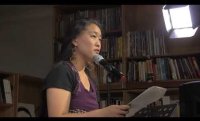Interior/Exterior
In a 2023 BOMB Magazine interview by Wendy Xu, she asks Emily Lee Luan about the cinematic, image-specific aesthetic of the poems in her collection 回 / Return (Nightboat Books, 2023). “I think my poems try to understand internal emotional change through the external world—that might be why image and scene are so central,” says Luan. “If you look at something for long enough, then you might be able to understand what’s happening within you.” Take inspiration from this juxtaposition between interiority and externality, and the notion of finding understanding and connection through prolonged observation, and write a poem that uses extensive imagery to reflect the speaker’s internal emotional state. In lieu of expository description, how does imagistic expression lend a different kind of dynamism to your work?









